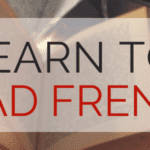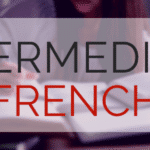
Learning French for beginners is actually fairly easy: many basic French vocabulary words have similarities to their English counterparts, and simple sentence structure in French is almost identical to English. Here are some tips to get beginners learning as quickly as possible.
Where to Start
There are a range of lessons on this site, from beginner level to advanced learners. Below is a suggested starting list for beginning French learners.
Learning the basics of the language
- How French is different from English, written in plain English.
- Learn the French alphabet, French spelling, and French pronunciation. With pronunciation especially, make sure you get a good grasp on it before moving on to more advanced topics. It’s easy to get incorrect pronunciations in your head if you don’t learn the rules, since there are many, many unvoiced syllables and letters in French.
Beginning grammar lessons
- Start with the French present tense. It forms the foundation of all the other verb tenses, and it will be the best way to immediately become able to form sentences.
- Note: Most French verbs have regular conjugations, but, as in most languages, the most common verbs are irregular. The verbs “to be” – être, “to go” – aller, “to have” – avoir, and “to make” – faire, are the four most important verbs to know.
- Adjectives play a major role in beginning to communicate in French. Once you have the verbs and some basic vocabulary down, memorize the basic French adjectives.
- You’ll use pronouns often in sentences, and fortunately they work almost completely the same as in English. Beginners should start with subject pronouns.
- A good way to cap off a “beginner” grammar category would be to learn the most basic French past tense – the passé composé.
Beginning vocabulary
- Besides learning the present tense, your first priority starting out is to get a basic working vocabulary down. Start with our beginner’s French vocabulary list and then move on to reviewing our other vocabulary lists.
How to Stay Motivated
Learning any new language is time-consuming and sometimes genuinely difficult. The great thing about learning a language in a methodical fashion, though, is that you can start with the most common words and grammar, and work from there, first learning the pieces that are most vital to basic comprehension and expanding your skills from that point.
This approach is the best cost per payoff you can get. For example, it’s a lot more useful in basic conversation to know the present tense than it is the plus-que-parfait. That’s why we suggest above that you start with the present tense.
Take each lesson as a small step up in your skills, and don’t try to skip steps. If you build a solid foundation, future lessons will intuitively make sense instead of becoming something you have to memorize without understanding what you’re really learning.



